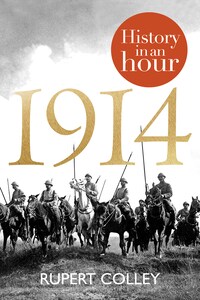Title Page
Introduction
Turn of the Century: States of the Nations
Treaties and Alliances
Assassination of an Archduke
The Road to War
The Willy and Nicky Telegrams
The Schlieffen Plan
Belgium
Battle Begins
Mons
Marne
The First Battle of Ypres
Eastern Front
Austria-Hungary
War Crimes
The Wider War
The War at Sea and in the Air
The Christmas Truce
Appendix 1: Key Players
Appendix 2: 1914 Timeline
Got Another Hour?
Copyright
About the Publisher
On 4 February 2012, Florence Green died. Born in Edmonton, London in 1901, she was 110 years old. Having been a member of the Women’s Royal Air Force, she was also the last veteran of the First World War. The ‘Great War’, as it was originally called, had truly passed from living memory into history.
It all started in southeastern Europe, in the corner of the Balkans, an area known for its volatile tendencies but isolated enough for it not to concern the average person on the streets of London, Paris or Brussels, let alone the citizens of Sydney, Wellington or Madras. Yet within just over a month of the assassination of the heir to the Austro-Hungarian throne, as the efforts of negotiation and diplomatic bluffs failed, war had erupted, spreading across Europe then across the globe. But no matter, it would be a short war – finished before the fall of the autumn leaves or over by Christmas. Motivated by patriotism and nationalism, and peppered, in varying degrees, by ambition, prestige, fear, revenge, obligation or simply survival, nations went to war.
In 1914, the war of people’s imagination lay in the previous century – colourful uniforms, military bands playing, flags flying and men on horseback, and short, sharp conflicts. But 1914 proved to be different, a watershed, as old notions of war were trampled in the mud. No one could have perceived such a war of unimaginable horror, fought on such an unprecedented scale; a war fought with terrifying new weapons, of death on an industrial magnitude, a war that involved so many nations and reached into the very fabric of society; a war that brought to an end the Belle Époque of Edwardian life. The events of 1914, and the war that followed, changed the world and shaped the twentieth century.
This, in an hour, is 1914.
Europe in the early twentieth century was a continent of superpowers and would-be superpowers. Motivated by ambitions of self-aggrandizement and self-preservation, they eyed each other with suspicion, envy and often fear bordering on the paranoia.
Germany was the cause of much of this fear. A unified country only since 1871, Germany, under the careful management of its chancellor, Otto von Bismarck, had rapidly built itself up into a modern, militaristic, industrial powerhouse. It looked to the colonial assets of its neighbours, especially the vast, sprawling empire of Great Britain, and set on a course of obtaining its own empire, colonies, its own ‘place in the sun’. And for that, it needed a navy that could rival Britain’s, whose naval supremacy had ruled the waves since the days of Nelson a century before. The German Kaiser, Wilhelm II, had, as a boy, admired the ‘proud British ships’, and wished as an adult to ‘possess a navy as fine as the English’.
Kaiser Wilhelm II, 1905
Germany realized that Russia was becoming stronger, building its military and industrial capacity and extending its network of railways – a vital factor in moving huge armies across large distances. If there was to be war, the longer it was delayed, the greater the strength of Russia: ‘Every year we wait, lessens our chances,’ said the German chief-of-staff, Helmuth von Moltke (the Younger).
Great Britain, on her part, wanted nothing more than to protect her empire – which, as every British schoolchild was taught, covered a quarter of the globe’s landmass – and the associated opportunities for commerce the empire provided. For much of the latter half of the nineteenth century, Britain had remained aloof from international affairs, concentrating only on matters of self-interest and its empire consisting of 400 million people – a situation it called its ‘splendid isolation’. The emergence of Germany as a perceived new threat, to both Britain’s colonial holdings and to the nation itself, changed that.
Knowing the importance of its navy not simply for the empire but for home security as well, and increasingly fearful of Germany’s expansive desires, Britain was determined to maintain its dominance. In 1906, Britain launched the first of a much-feared new class of battleship, HMS Dreadnought, which was far superior to anything that had previously sailed. As well as this, Britain implemented legislation to ensure continual commitment to naval expansion, despite the enormous cost involved, thus engaging in an arms race with Germany. (By 1914, Britain’s fleet of battleships numbered forty-nine, outstripping Germany’s fleet of twenty-nine.)














